Torchdown vs. Single-Ply PVC: Which One Is Best for Your Roof?
March 17th, 2025
5 min read
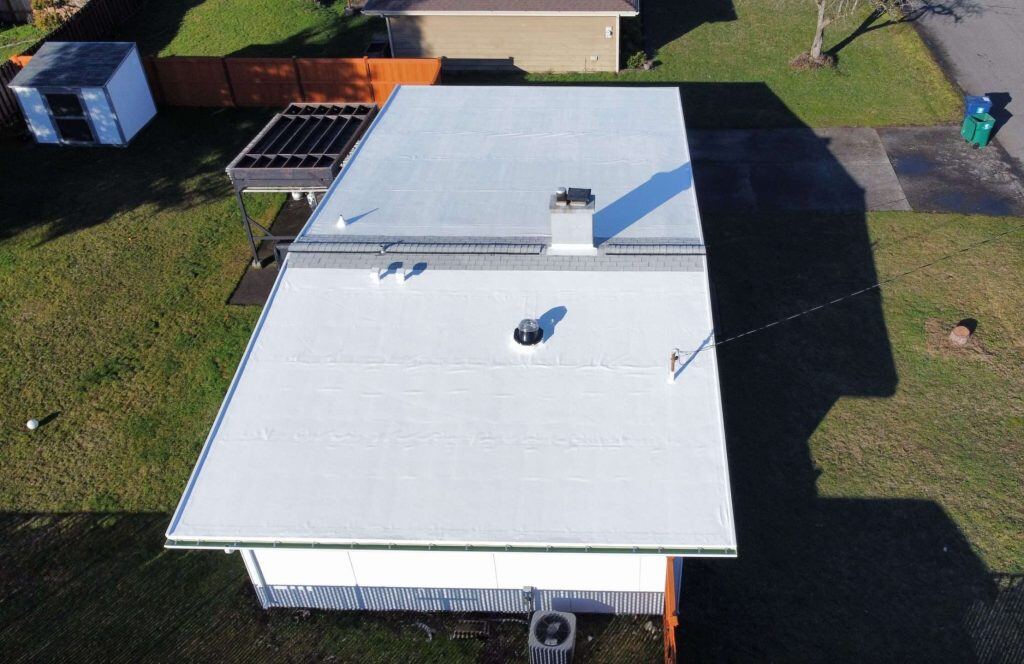
Are you struggling to choose the right roofing material to protect your flat or low-slope roof from leaks and other costly damage? Are you looking for a roofing material that offers better resistance to leaks, punctures, and water pooling?
At RoofSmart, we understand that choosing the right roofing material can be difficult, especially when it comes to flat or shallow-slope roofs. To help our customers choose roofing materials, we take them through our SmartMatch Needs Analysis process. This matches them with several options that best meet their needs, preferences, and budget.
In this article, you’ll learn about the pros and cons of each type of material (torchdown and single-ply PVC) and how each one performs in different categories, which include:
- Longest Lifespan
- Water Resistance
- UV Resistance
- Flexibility in Cold Weather
- Impact and Scuffing Resistance
- Higher Risk of Fire Damage
- Difficulty of Installation
- Cost
By the end, you’ll understand when each material type is ideal and be able to decide if torchdown or single-ply PVC is right for you.
What is torchdown?
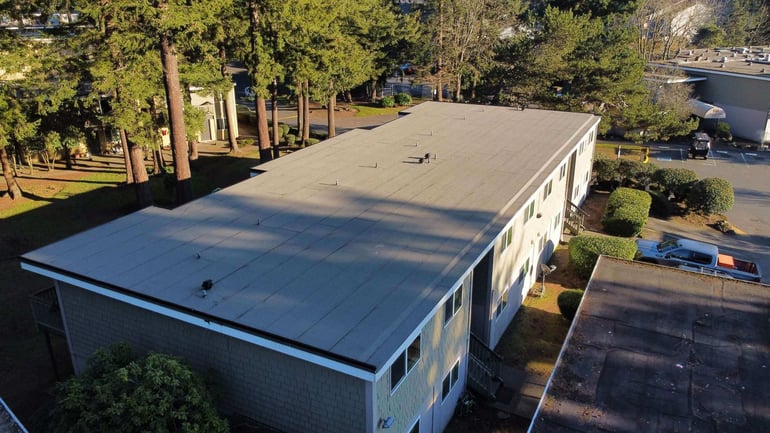
Torchdown is a roofing material used on flat or low-slope roofs. It is made of modified bitumen, which is a mixture of asphalt and other materials , including rubber and plastic. It looks very similar to asphalt shingles. Sometimes it has a layer of granules on top, but sometimes it’s smooth.
What is single-ply PVC?
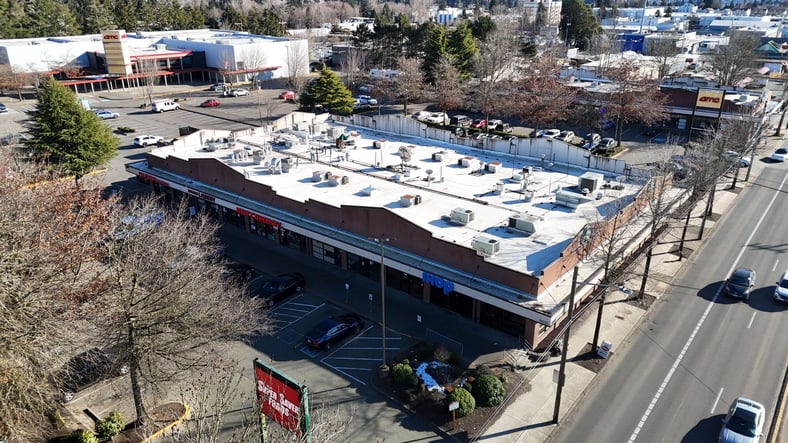
PVC is a durable and flexible material also used on flat or low-slope roofs. It is a single-layer sheet that mainly consists of plastic polymers . It looks very similar to a pool liner and typically only comes in white.
How do you know when torchdown or single-ply PVC is right for you?
This section will name several categories that are important to consider when deciding which flat roof material you want to use. Both types of material (torchdown and single-ply PVC) will be evaluated, and a winner will be chosen for each category.
This can help you decide between the two options because you’ll be able to clearly see which roof material best matches your preferences and needs.
Although single-ply PVC was the overall winner in this article (because it won in more categories than torchdown), you still might decide that torchdown is a better choice for you.
Here is the category comparison of torchdown vs. single-ply PVC:
Longest Lifespan
Winner: Single-Ply PVC
When installed properly, you can expect your torchdown roof to last 12 to 15 years before it starts to have problems (unless you do the 2-ply assembly with 2 layers of modified bitumen material).
However, single-ply PVC typically around 30 years , making it the longer-lasting option when minimal foot traffic or wear and tear is involved
Water Resistance
Winner: Single-Ply PVC
Torchdown has good water resistance as long as it is sealed properly and there’s no standing water. However, the problem comes from the drain site because it is difficult to seal around it using torchdown and it can’t be welded to the metal part of the drain.
Eventually, the seal will fail and start to leak . This can happen after 12 to 15 years (or sooner). However, PVC creates a complete seal around drains and it takes longer to break down.
Sealing around objects on the roof (like skylights or chimneys) can be difficult with flat roof products because they aren’t always easily adaptable to corners and edges. But, PVC products sometimes come with pre-made corner pieces that you can use to get a better seal.
This makes it better at keeping water out for longer, meaning that you’ll only get a leak from physical damage. Torchdown does not have this option.
If there is a leak, your roof decking can end up rotting, which will add extra money to the roof replacement job:
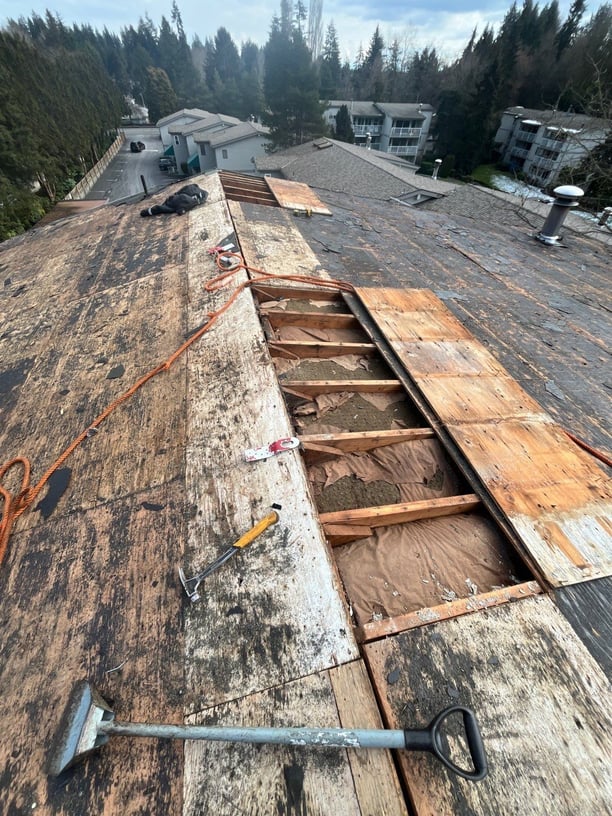
UV Resistance
Winner: Single-Ply PVC
Torchdown is an asphalt-based material mixed in with other materials. Naturally, it does not have good UV resistance, but it comes with a granule layer on top that will protect it.
However, single-ply PVC is a plastic-based material that is UV-resistant and even reflects heat.
Flexibility in Cold Weather
Winner: Torchdown
Both of these materials are susceptible to becoming brittle and cracking in cold weather as they get older. Torchdown is typically more flexible, but single-ply PVC has a much higher risk of cracking at cold temperatures if a branch (or heavy foot) were to “impact” it while brittle.
Impact and Scuffing Resistance
Winner: Torchdown
Typically, torchdown is thicker and more resistant to scuffing. So, it isn’t really impacted when you walk on it. On the other hand, PVC only has one layer, making it more susceptible to damage or scuffing when you walk on it.
Torchdown is more wear-resistant than single-ply PVC because of the granulated cap sheet. It can handle a lot more walking and general wear and tear than single-ply membranes.
Higher Risk of Fire Damage
Winner: Single-Ply PVC
Both torchdown and single-ply PVC have good fire resistance . However, if you live in an area that has a high risk of fire, torchdown might not be the best option because it is installed with a blowtorch.
While a skilled installer shouldn’t have any issues, there is always the risk of an accident happening that results in fire damage to your home.
Difficulty of Installation
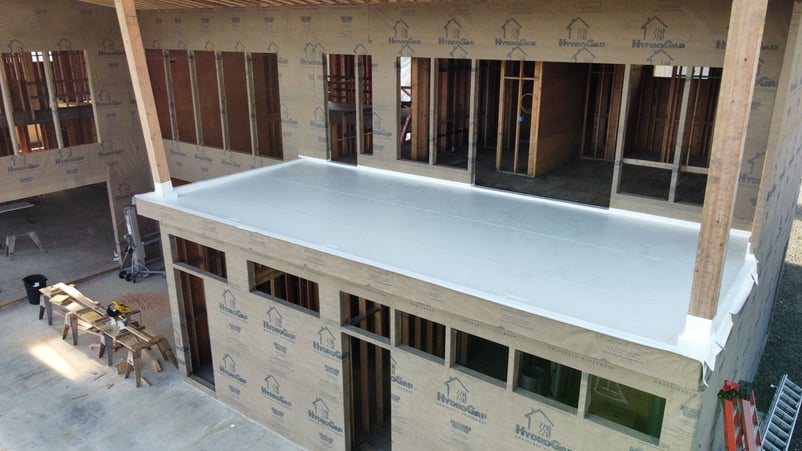
Winner: Single-Ply PVC
Torchdown and single-ply PVC take about the same amount of labor and time to install. The difference is that torchdown is installed using a blowtorch and cannot be installed in cold weather.
Single-ply PVC is installed with a hot air gun and sticks to the roof. There is more flexibility with the temperature at which it can be installed.
Important note: Neither one should be installed in the rain, no matter the temperature outside.
Cost
Winner: Torch Down
Torch down is typically $8 to $9 per square foot, while single-ply PVC is around $10 to $11 per square foot (without project-specific considerations). Torch down is often a better value, making it the winner of this category.
It also has more flexibility with regard to the underlying assembly.
Torchdown is a sturdier membrane that doesn’t need as much backing, so the use of underlayment, thermal break, and backer board can change from contractor to contractor. Professional roofers can help you avoid costly mistakes that require repairs or replacements down the road.
These cost estimates include costs for materials and labor, but your project will almost certainly have other factors: access, additional layers, insulation, new plywood, etc. As your project progresses, remember that there are many other factors that impact the total cost of the roofing project (including the way that your roofing contractor decides to install your roof).
Pros, Cons, and Cost Comparison Table
To make the comparison process quick and easy, we’ve compiled this information into a comparison table.
| Factor | Torch down Roofing (APP/SBS) | Single-Ply PVC Roofing |
| Durability and Lifespan | ✔️ Very durable (12-15 years) | ✔️ Highly durable (20-30 years) |
| Water Resistance | ✔️ Excellent due to multiple layers | ✔️ Excellent due to welded seams |
| UV Resistance | ✔️ Good (especially APP-modified bitumen) | ✔️ Excellent (white membrane reflects heat) |
| Flexibility in Cold Weather | ✔️ Better (SBS type) | ❌ Less flexible (can crack in extreme cold) |
| Impact and Scuffing Resistance | ✔️ High (especially in multi-layer systems) | ❌ Moderate (prone to punctures, needs walk pads) |
| Fire Safety | ❌ Risky (torch application increases fire hazard) | ✔️ Fire-resistant (self-extinguishing) |
| Difficulty of Installation | ❌ Labor-intensive (requires torches, hot work) | ✔️ Easier, faster (mechanically fastened, adhered, or ballasted) |
| Cost | 💲💲 Moderate-High | 💲💲💲 Moderate-High (similar costs) |
When is torchdown the best fit?
Torchdown does not handle standing water well. In fact, having standing water voids your warranty coverage. So, torchdown is a good fit if you have a little bit of a slope on your roof that helps it to have continuous drainage.
Torchdown is also a good option if you are looking for an affordable flat roofing option. It costs the least out of all the options.
If you know that you’ll have lots of foot traffic on your roof, torchdown is a good choice because it will hold up better. For example, if you have a commercial building and you need to give people roof access to service it or install things, torchdown would be ideal.
When is single-ply PVC the best fit?
If you want to install your roof and not have to replace it for as long as possible, then PVC is a good choice because it has a longer lifespan.
If you live in a rainy, wet area like Seattle and are concerned about leaks in your roof, PVC is a great choice for you. Even though torchdown does a decent job, PVC provides superior water resistance, especially in vulnerable areas like the drain.
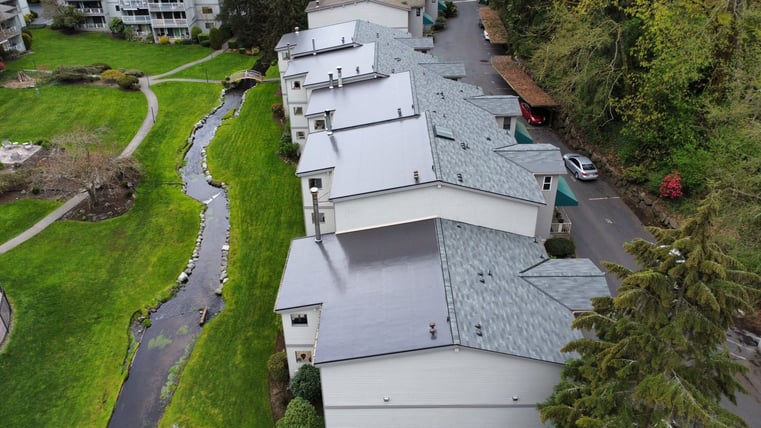
What’s Next? Finding the Right Flat Roof Option for You
If you’ve been struggling to choose between torchdown and single-ply PVC for your flat or low-slope roof, you’re likely concerned about durability, water resistance, and cost. Torchdown offers a more budget-friendly option with reliable impact resistance, while PVC promises superior longevity and leak protection.
After weighing the pros and cons of torchdown and single-ply PVC, you now have a clearer understanding of which roofing material aligns with your needs.
Still not sure which roofing option is right for you? Check out our article “4 Types of Flat Roofs: Pros, Cons, and Costs” to learn about your other flat roof material options and see how they compare to torchdown and single-ply PVC.
Jim Singleterry is the CEO and founder of RoofSmart. He is passionate about getting to the root of each customer's roofing problems and helping them find the right solution for their roof.
Topics:



